- Last Updated: January 15th, 2026
Key Takeaways
Social media platforms can have both positive and negative psychological impacts, offering connectivity and support but also potentially contributing to mental health issues like depression and anxiety.
Developing healthy social media habits, such as setting boundaries, limiting screen time, and cultivating digital literacy skills, is essential for mitigating the negative effects of social media use.
Social media companies have a responsibility to implement safeguards, moderate content, and collaborate with mental health professionals to create a safer online environment for users' well-being.
Overview of the Psychological Impact of Social Media
On this page, we’ll discuss the psychological impact of social media based on the 2024 study, exploring how social media affects mental health, common psychological issues associated with social media use, and much more.
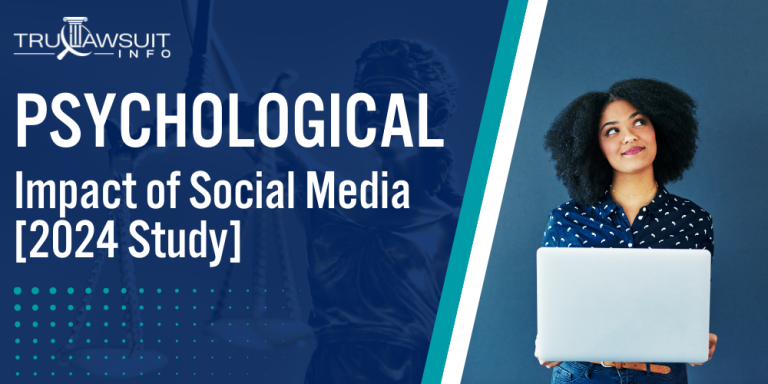
Intro to the Impact of Social Media
Social media’s reach into daily life is significant, influencing various aspects of our behavior and mental well-being.
Here are some points detailing the scope of social media’s impact:
- Online Social Networks and Interactions: Platforms are designed to foster communication and are often the primary way individuals interact with friends and communities.
- Content Consumption: Users frequently consume a vast range of content, from news to personal updates, which can shape opinions and emotions.
- Social Comparisons: Exposure to the curated lives of others can result in social comparison, affecting self-esteem and satisfaction.
- Sleep and Health Disruption: Excessive time online, especially before bed, can interfere with sleep patterns and overall physical health.
If you or a loved one have experienced negative psychological effects due to social media, the results from this 2024 study may indicate broader trends in mental health impact.
Contact TruLawsuit Info using the chat feature on this page for a free case evaluation today.
Positive Effects of Social Media on Mental Health
Social media platforms have emerged as significant venues for fostering psychological well-being through enhanced connections and avenues for personal expression.
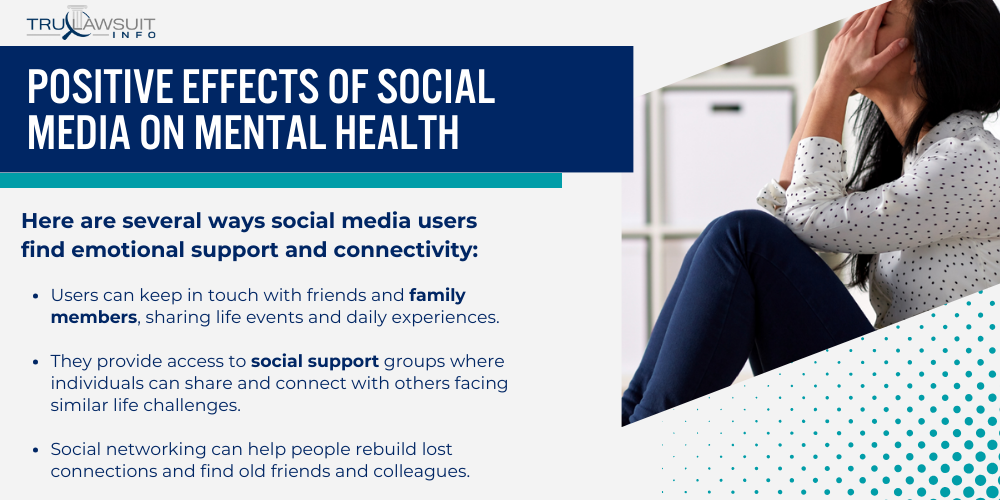
Increased Connectivity and Social Support
Social networking sites offer users the ability to maintain and grow connections irrespective of physical distance.
Here are several ways social media users find emotional support and connectivity:
- Users can keep in touch with friends and family members, sharing life events and daily experiences.
- They provide access to social support groups where individuals can share and connect with others facing similar life challenges.
- Social networking can help people rebuild lost connections and find old friends and colleagues.
- Online communities often arise around competing interests, providing a sense of belonging and acceptance.
Opportunities for Self-Expression and Identity Exploration
Social media opens up spaces for individuals to express themselves and explore various aspects of their identity.
To illustrate:
- Platforms enable the sharing of creative work, such as writing, art, and music, which can be affirming and lead to positive feedback.
- Users can explore different facets of their identity, from the professional to the personal.
- There is an opportunity to gain new perspectives and learn from the diverse experiences found within the global online community.
- Social media can be a tool for empowerment and raising awareness on personal and social issues.
Negative Consequences of Social Media Use
The psychological impact of social media on adolescent health and mental well-being can be substantial.
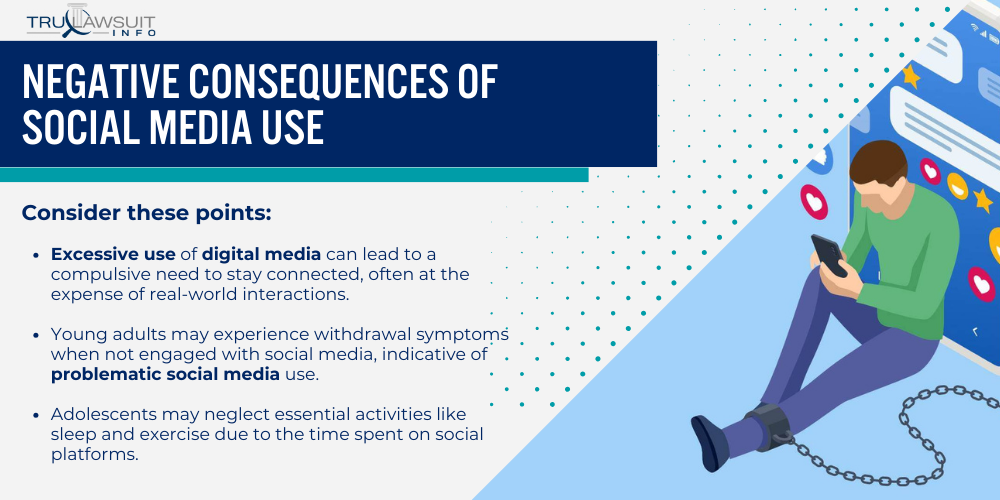
It influences various aspects of young adults’ lives, from their self-esteem to their social habits.
Addiction and Excessive Screen Time
Social networking addiction and excessive screen time are significant concerns in the digital age, particularly among young adults.
Consider these points:
- Excessive use of digital media can lead to a compulsive need to stay connected, often at the expense of real-world interactions.
- Young adults may experience withdrawal symptoms when not engaged with social media, indicative of problematic social media use.
- Adolescents may neglect essential activities like sleep and exercise due to the time spent on social platforms.
- Prolonged screen time is linked to negative health effects, including poor posture and eye strain.
Comparison and Self-Esteem Issues
The way social media fosters comparison can lead to self-esteem issues.
These are some specific effects:
- Social platforms create an environment where young adults often compare their lives to the idealized lives of others, leading to feelings of inadequacy.
- A negative body image can develop from exposure to unrealistic beauty standards prevalent on social networking sites.
- Studies suggest a correlation between social media use and the development of low self-esteem, particularly related to personal appearance and lifestyle.
- Witnessing the seemingly perfect lives of others can exacerbate the feeling of not measuring up, impacting one’s perception of self-worth.
Cyberbullying and Online Harassment
Cyberbullying and online harassment are dark realities of social media use.
Here’s what is particularly troubling:
- The anonymity of the internet can embolden individuals to engage in hurtful behavior they wouldn’t typically exhibit in person.
- Cyberbullying can lead to severe psychological impact, including depression, anxiety, and in extreme cases, suicidal thoughts or actions.
- Victims might feel isolated since social media is a space where many young people spend significant amounts of time.
- The fear of missing out or being excluded can make it difficult for victims to disengage from harmful online environments despite the negative effects.
Social Media and Adolescent Development
Social media is deeply integrated into the lives of adolescents, affecting their social skills and attention spans, with broader implications for their mental health and academic performance.
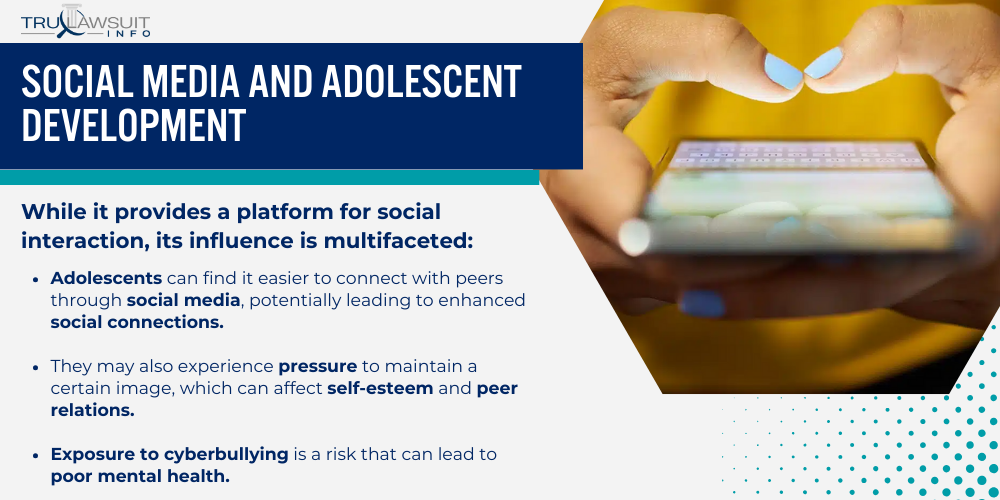
Impact on Social Skills and Interpersonal Relationships
Social media use among adolescents can have a significant effect on their social skills and interpersonal relationships.
While it provides a platform for social interaction, its influence is multifaceted:
- Adolescents can find it easier to connect with peers through social media, potentially leading to enhanced social connections.
- They may also experience pressure to maintain a certain image, which can affect self-esteem and peer relations.
- Exposure to cyberbullying is a risk that can lead to poor mental health.
- There’s a greater opportunity for miscommunication without the cues present in face-to-face interactions.
Teens’ social media habits often shape their understanding of social norms and behaviors, highlighting the need for guidance on healthy online relationships.
Influence on Academic Performance and Attention Span
The relationship between social media and academic performance is complex, with both potential benefits and drawbacks.
Here’s how adolescents’ mental health and attention spans are impacted:
- Constant notifications and social updates can lead to reduced concentration on academic work.
- Multi-tasking between homework and social media may diminish the quality of learning.
- Some students use educational groups on social media for study support.
- Poor mental health can be exacerbated by social media, affecting a young person’s ability to perform academically.
Teen social media use warrants attention to the balance between digital and academic lives to support their development and learning capabilities.
The Role of Social Media in Mental Health Disorders
The increasing scrutiny on social media use points to its significant impact on individuals’ mental health issues, particularly among younger demographics who are the most active users.
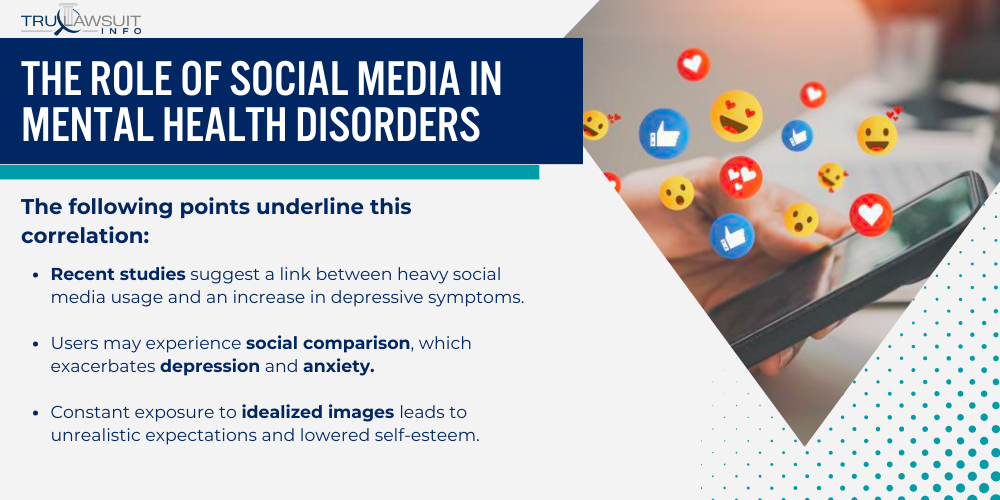
The intersection of public health and social media is pivotal in understanding depressive symptoms and anxiety-related disorders.
Correlation with Depression and Anxiety Symptoms
Social media platforms, while connecting individuals, may also contribute to feelings of social anxiety and depression.
The following points underline this correlation:
- Recent studies suggest a link between heavy social media usage and an increase in depressive symptoms.
- Users may experience social comparison, which exacerbates depression and anxiety.
- Constant exposure to idealized images leads to unrealistic expectations and lowered self-esteem.
- There is evidence of a vicious cycle where depression could lead to increased social media use, further worsening the mental health condition.
Potential Triggers for Eating Disorders and Body Dysmorphia
The pervasive influence of social media can significantly shape one’s body image and exacerbate or even trigger eating disorders and body dysmorphia.
This issue is compounded by specific social media behaviors and content that reinforce unhealthy beauty standards and eating patterns.
The impact of social media on body image concerns and eating disorders is particularly pronounced, with several triggers:
- Highly curated content often promotes narrow beauty standards, leading to negative body image perceptions.
- Social platforms can act as echo chambers for harmful diet culture messages, intensifying eating disorder risks.
- The spread and endorsement of ‘fitness’ trends frequently overlook healthy practices in favor of appearance-focused outcomes.
- Comparing oneself to others on social media can trigger or exacerbate body dysmorphia and related mental health issues.
Psychological Impact of Social Media Echo Chambers
Social media platforms have become fertile grounds for the spread of misinformation and the formation of echo chambers.
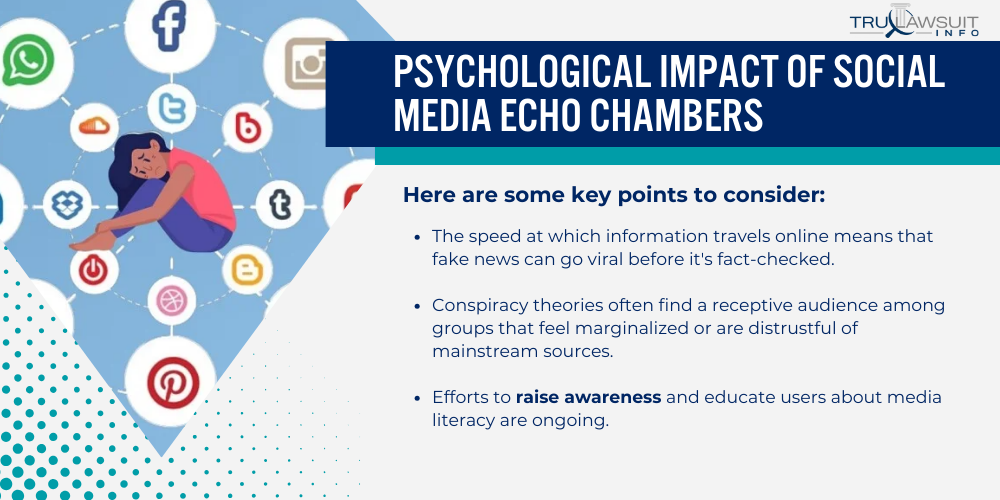
These phenomena not only distort public discourse but also reinforce division and reduce the exposure to a diversity of viewpoints.
Spread of Fake News and Conspiracy Theories
Recent research shows that social media sites are major conduits for the spread of unverified and false information.
Here are some key points to consider:
- The speed at which information travels online means that fake news can go viral before it’s fact-checked.
- Conspiracy theories often find a receptive audience among groups that feel marginalized or are distrustful of mainstream sources.
- Efforts to raise awareness and educate users about media literacy are ongoing.
- Social media algorithms can unintentionally prioritize sensational or controversial content, which can include misinformation.
Polarization and Political Divide Amplified by Algorithms
Algorithms on social media platforms play a significant role in what content users see, often leading to increased polarization.
Here’s what one should know:
- User behavior and algorithmic recommendations can create a feedback loop that intensifies polarization.
- A systematic review of studies indicates that like-minded individuals tend to cluster together, strengthening pre-existing beliefs.
- Pew Research Center findings suggest that political divisions are increasingly visible on social media.
- Social platforms are challenged to balance content personalization with the need to expose users to a broad range of ideas.
Psychological Impact of Social Media Habits
The psychological impact of social media encompasses a broad range of effects on human behavior and emotional well-being.
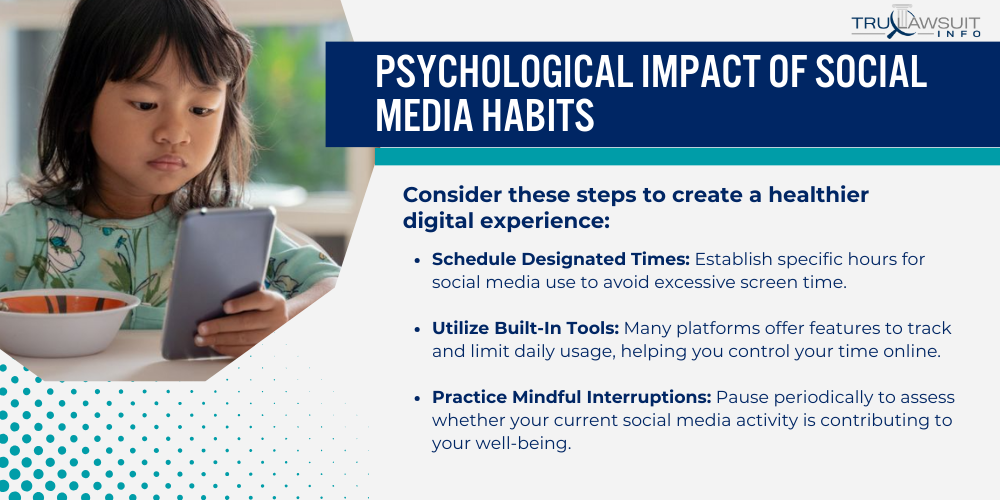
Engaging with social media platforms can influence social relationships, self-esteem, and overall mental health.
To reduce the psychological impact of social media, it’s essential to cultivate healthy usage habits.
This can affect how much time you spend online and the quality of your interactions.
Set Boundaries and Limit Screen Time
Consider these steps to create a healthier digital experience:
- Schedule Designated Times: Establish specific hours for social media use to avoid excessive screen time.
- Utilize Built-In Tools: Many platforms offer features to track and limit daily usage, helping you control your time online.
- Practice Mindful Interruptions: Pause periodically to assess whether your current social media activity is contributing to your well-being.
- Align with Personal Goals: Ensure your social media usage reflects your personal priorities and values.
Fostering Digital Literacy and Critical Thinking
Developing digital literacy and critical thinking skills is crucial for navigating the psychological impact of social media.
These skills help individuals discern credible information and reduce exposure to harmful content.
Here are some strategies:
Evaluate Sources and Promote Diversity
- Check Information Credibility: Learn to evaluate the reliability of the sources you engage with on social media.
- Embrace Diverse Perspectives: Follow a variety of accounts to gain a well-rounded view of topics, reducing echo-chamber effects.
- Reflect Before Sharing: Critically assess the content you share to ensure accuracy and alignment with your values.
- Engage Constructively: Participate in discussions with respect and a genuine desire to understand differing opinions.
Promoting a Positive Psychological Experience
Understanding the psychological impact of social media is key to maintaining mental well-being in the digital age.
By setting clear boundaries, building digital literacy, and engaging thoughtfully, you can reduce the negative effects and foster a more positive experience online.
Taking Responsibility for the Psychological Impact of Social Media
In the digital age, social media companies play a pivotal role in shaping the information landscape.
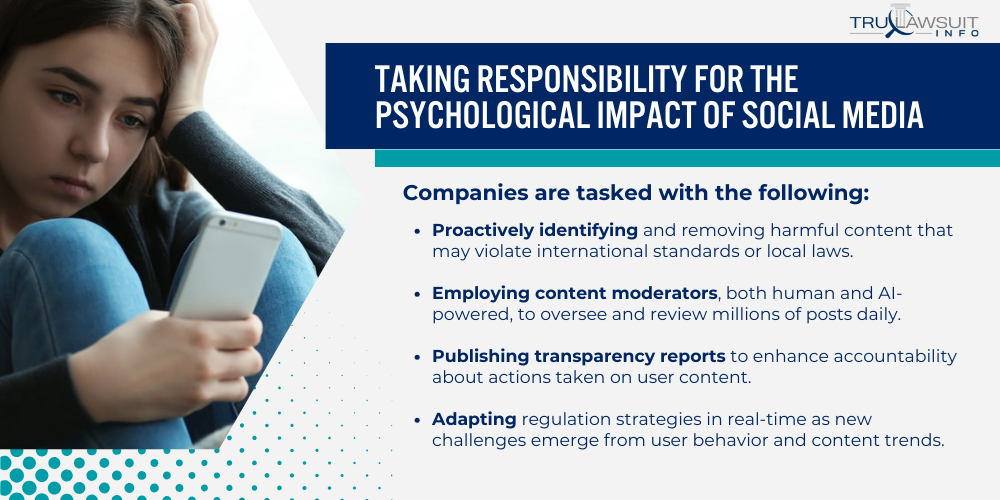
They are tasked with balancing user engagement with the need to maintain safe online spaces.
This involves the careful implementation of content moderation policies and collaboration with various experts to safeguard users.
Implementing Safeguards and Content Moderation Policies
Ensuring user safety on social media platforms is no small task.
Companies are tasked with the following:
- Proactively identifying and removing harmful content that may violate international standards or local laws.
- Employing content moderators, both human and AI-powered, to oversee and review millions of posts daily.
- Publishing transparency reports to enhance accountability about actions taken on user content.
- Adapting regulation strategies in real-time as new challenges emerge from user behavior and content trends.
Collaborating with Mental Health Professionals
Protecting user well-being is another responsibility social media platforms undertake.
Their collaboration efforts involve:
- Partnering with mental health organizations to create supportive content and reporting mechanisms for users in distress.
- Incorporating input from psychologists and researchers to design features that promote positive engagement.
- Monitoring the impact of social media on mental health as per the Surgeon General’s advisory on the subject.
- Addressing the potential risks of social media use, especially among younger demographics, as highlighted by medical internet research.
In fulfilling these roles, social media companies must navigate the interests of stakeholders while honoring their commitments to users and the broader community.
Future Directions of the Psychological Impact of Social Media Research
With advancements in technology and psychological understanding, identifying the long-term effects of social media and developing healthy usage guidelines are central to future research directions.
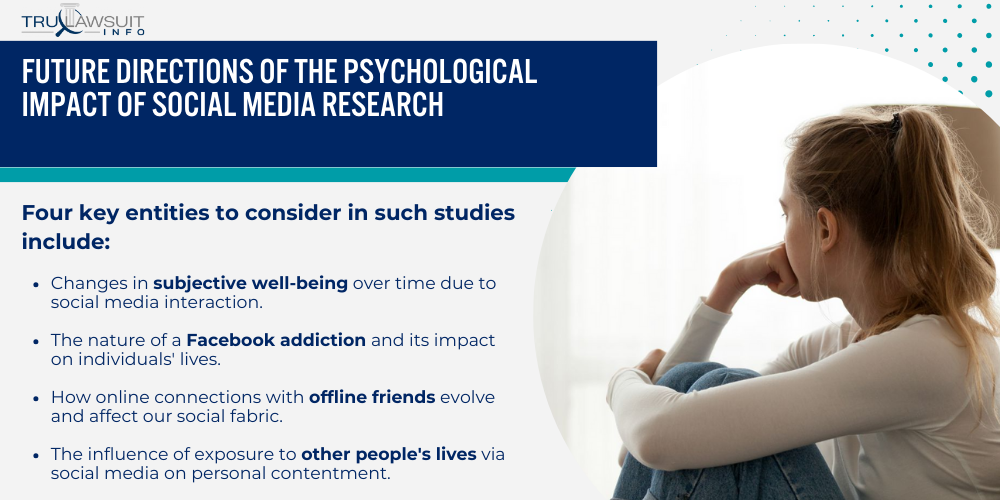
This section encapsulates two significant focal points of current scholarly attention.
Longitudinal Studies on Long-Term Effects
Longitudinal studies are paramount in understanding the long-term effects of social media on human beings, especially as they transition through various age groups.
Four key entities to consider in such studies include:
- Changes in subjective well-being over time due to social media interaction.
- The nature of a Facebook addiction and its impact on individuals’ lives.
- How online connections with offline friends evolve and affect our social fabric.
- The influence of exposure to other people’s lives via social media on personal contentment.
Evidence-Based Guidelines for Healthy Social Media Use
To enhance mental well-being, it’s vital to formulate guidelines that not only encourage positive social media interactions but also safeguard users from its potential harms.
This endeavor involves collaboration among psychologists, tech experts, and educators, aiming to create a balanced approach to social media use.
Creating evidence-based guidelines for healthy social media use requires a multifaceted approach that includes:
- Establishing parameters for self-expression that encourage positive interactions and mitigate psychological risks.
- Deploying strategies to give appropriate credit to creators while respecting institutional affiliations.
- Developing age-specific recommendations to foster meaningful relationships rather than comparative analyses of others’ lives.
- Encouraging an awareness of the real versus curated selves presented and consumed through social media platforms.
The results from this upcoming research will offer valuable insights for psychologists, educators, and social media users, guiding a more informed and mentally healthy engagement with social networking sites.
TruLawsuit Info: #1 Social Media Mental Health Lawyers
Lawyers specializing in mental health issues related to social media are increasingly sought after. They examine instances where social media platforms may have contributed to emotional distress or psychological harm.
Their role encompasses a unique blend of technology law and mental health advocacy.
Here’s what they typically focus on:
- Evaluating Claims: Lawyers scrutinize the details of how social media use could have impacted an individual’s mental health.
- Litigation: They represent clients in lawsuits against social media companies, alleging harmful consequences of platform usage.
- Advisory: These legal professionals may also advise social media companies on how to improve their platforms to mitigate mental health risks.
- Public Policy: They can be involved in shaping regulations aimed at protecting users from potential mental health harms associated with social media.
These legal experts face a balance between preserving the freedom of expression that social media provides and protecting individuals’ mental well-being.
They have to prove causation and correlate specific design attributes of social media platforms to adverse mental health outcomes.
A recent example involves a coalition of attorneys general filing a lawsuit against Meta, the parent company of Facebook and Instagram, over allegations that the company designed their platforms in a way that harms youths’ mental health.
Legislation differs widely from one jurisdiction to another, which means legal strategies must be tailored accordingly.
The lawyers delve into the legal aspects of social media with precision, assessing each case on its unique merits and evidence to support claims of mental harm.
They also provide valuable support to those who may be unaware of social media’s psychological impacts or their legal rights regarding these impacts.
Frequently Asked Questions
-
Social media alters the dynamic of interpersonal communication by allowing for more frequent and instant contact.
However, it can also lead to less face-to-face interaction and potentially shallow relationships.
-
Youth development on social media often involves shaping identity and social skills.
Nonetheless, excessive use can contribute to issues such as cyberbullying and social anxiety.
-
While it offers access to educational resources and peer support, social media can also lead to distraction and reduced focus, potentially impairing students’ academic performance.
-
Social media enables rapid information sharing, but the lack of content regulation can foster the spread of misinformation, necessitating critical analysis by users.
-
It serves as a platform for political mobilization and discourse, giving a voice to diverse groups.
However, it’s also prone to polarization and echo chamber effects, influencing public opinion.
-
Excessive social media use has been linked to mental health issues like depression and anxiety.
Conversely, it can provide a sense of community and support for individuals.

Attorney Jessie Paluch, founder of TruLawsuit Info, has over 25 years of experience as a personal injury and mass tort attorney, and previously worked as an international tax attorney at Deloitte. Jessie collaborates with attorneys nationwide — enabling her to share reliable, up-to-date legal information with our readers.
Legally Reviewed
This article has been written and reviewed for legal accuracy and clarity by the team of writers and legal experts at TruLawsuit Info and is as accurate as possible. This content should not be taken as legal advice from an attorney. If you would like to learn more about our owner and experienced injury lawyer, Jessie Paluch, you can do so here.
Fact-Checked
TruLawsuit Info does everything possible to make sure the information in this article is up to date and accurate. If you need specific legal advice about your case, contact our team by using the chat on the bottom of this page. This article should not be taken as advice from an attorney.
You can learn more about the Social Media Harm Lawsuit by visiting any of our pages listed below:
Here, at Tru Lawsuit Info, we’re committed to helping victims get the justice they deserve.
To do this, we actively work to connect them with attorneys who are experts in litigating cases similar to theirs.
Table of Contents
Tru Lawsuit Info is a reliable source of information about issues that may affect your health and safety, such as faulty products, data breaches, and environmental hazards.
Our team of experienced writers collaborates with medical professionals, lawyers, and advocates to produce informative articles, guides, and other resources that raise awareness of these topics.
Our thorough research provides consumers with access to reliable information and updates on lawsuits happening around the country. We also can connect consumers with attorneys if they need assistance.
Here, at Tru Lawsuit Info, we’re committed to helping victims get the justice they deserve.
To do this, we actively work to connect them with attorneys who are experts in litigating cases similar to theirs.
